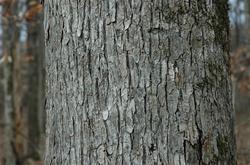 Photo by Laura Cotterman Photo by Laura Cotterman The South’s forests encompass a broad range of ecosystems and landscapes and are home to many rare, threatened, and endemic species of plants and animals. Forest ownership and uses in the South have been changing dramatically in the early 21st century, raising questions about the future of our southern forests. A huge transition in forestland ownership has been occurring, with the forest products industry divesting about three-fourths of its timberland holdings in the southern U.S. in the ten years between 1998 and 2008. What are the implications for forest management and sustainability? How will forest land ownership in the South continue to change in the future? Private landowners hold 86 percent of the forested land in the southern U.S., with two-thirds of this area owned by families or individuals. The average size of family-owned forest holdings is small: only 29 acres (although 60% of family-owned forests exceed 100 acres in size). Two-thirds of these private landowners harvest and sell trees from their land. In recent history, much of the South’s forests were owned by big timber production industries. . . . But in an immense ownership transition, the forest products industry divested about three-fourths of its timberland holdings between 1998 and 2008, and that trend is ongoing. Yet while southern U.S. forests comprise only 2 percent of the world’s total forest cover, they produce 12 percent of the world’s industrial wood and 19 percent of its pulp and paper products, making southern forests more industrially productive than any other forest area in the world. The number of timber mills in the region has dramatically decreased in recent decades, although the actual volume of timber harvesting has been on the rise, particularly with the South becoming, in just the past five years, the world’s largest exporter of wood pellets (going mostly as fuel to generate electricity in Europe and in China). Some two dozen wood pellet processing facilities in the South are currently consuming up to 10 million tons of wood annually, and another 20 planned pellet export mills will contribute to a total export of about 25 million tons of wood annually by 2017 (equivalent to 1.5 billion cubic feet of wood timbered annually).
The executive director of the Dogwood Alliance, a nonprofit education and advocacy group dedicated to protecting southern forest ecosystems, points out that pressure on the region’s forests is tremendous: disturbance to forest cover in the southern U.S. was four times more than that of all South American forests between the years 2000 and 2012 (see Science Daily, November 14, 2014). The Global Forest Watch interactive map depicts the vast scale of transformation of the region’s forests via logging, clearance, and development over the past two centuries. Natural forests in the South are being cut at increasing scales and scope for both timber products and urban development. While about 20% of southern forests are in managed pine tree plantations, half of the region’s timber products come from logging of natural forests. Data gleaned from the Global Forest Watch map show that the South has lost 18 percent of its overall forest cover in the decade and a half since the beginning of the 21st century. Recently released studies chartered by the U.S. Forest Service’s Southern Region and Southern Research Station, in collaboration with Southern State Foresters, analyzed the situation and trends, and portray a variety of possible futures for southern forests and their many ecosystems and values. We recommend you read the report of the Southern Forest Futures Project (SFFP) and especially Chapter 6 of the SFFP technical report, which examines the dynamics of forest ownership, forecasts of future change, and implications of these changes for forest management and conditions. We also suggest consulting the U.S. Forest Service’s Southern Forest Products – An Economic Engine “storymap,” which describes changes and trends in timber production in the southern U.S. Note: Information for this article was compiled from several online articles: “A Bleak Future for the U.S. Wood basket? Southern Forests under Threat” by Morgan Erickson-Davis as part of the Global Forest Reporting Network’s Mongabay series of e/news reports (April 6, 2016); and “Who Will Own Southern Forests in the Future: Findings about Family Forests and Industrial Ownership” by Zoe Hoyle, USFS Southern Research Station Delivery Group (March 31, 2016, posting).
1 Comment
|
When we see land as a community to which we belong, we may begin to use it with love and respect.... Conservation, viewed in its entirety, is the slow and laborious unfolding of a new relationship between people and land." There is in fact no distinction between the fate of the land and the fate of the people. When one is abused, the other suffers. From the PresidentSCP President Chuck Roe looked at land conservation along the route of John Muir's "Southern Trek." About ViewpointThis blog offers views of our Board and partners. We invite your viewpoint on the following questions: Archives
April 2024
Categories
All
|

 RSS Feed
RSS Feed